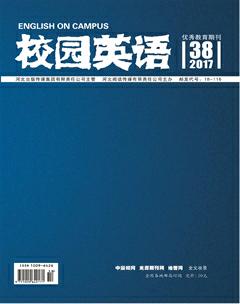A Study of L2 Motivational Self System of College Engineering Students in Yunnan
Xu+Feiyan
【Abstract】From the perspective of D?rnyeis L2 Motivational Self System (L2 MSS), which is the latest L2 motivation research model, this study conducted an investigation among students majoring in engineering from one of the universities in Yunnan province, analyzed the factors affecting college English learning for engineering majors. At the same time, the thesis would also provide suggestions to students in motivating themselves in English learning.
【Key words】L2 motivation; L2 Motivational Self System; ideal L2 self; ought-to L2 self; second language learning experience
1. Introduction
Motivation is one of important factors affecting English learning achievement. Generally speaking, if we have the motivation of learning English, we would learn it better. However, in recent years, English learning motivation of some students is gradually decreased or even lost in the course of English language learning.This phenomenon is extremely obvious for current college students, especially for science majors.Thus, it has become a serious problem for engineering students themselves.
2. Literature Review
As motivation is a very complicated concept and it has been studied from different perspectives during the past 50 years. In 1990s, the most widely acknowledged motivation theory in the field of L2 learning is Gardners (1985) social—educational theory. Though this theory is valid in most learning situations, particularly for less—commonly taught L2 students (Al Khalil 2011, 37), integrativeness is increasingly becoming less relevant at least in English learning. In 2005, L2 motivational self theory was put forward by D?rnyei which focuses on language learners L2 selves (L2 selves include ideal L2 self, ought-to L2 self and second language learning experience).
Just as the studies of motivation abroad, L2 motivational study has been also a hot area in SLA study for many years in China. There are lots of relevant researches that have been done. In conclusion, there are only few researches related to the L2 MSS theory in China. Therefore, it is urgent for researchers to extend L2 MSS theory by introducing new related factors and change different subject.
3. Methodology
Many scholars find that the single quantitative study seems to be objective, but it may not reliable. On the contrary, the qualitative study is more reliable when it refers to the subjective questions. The integration of quantitative and qualitative approaches can reduce the potential danger from an exclusive reliance on a single research approach (Bryman, 1992, p.69). Therefore, the methodology of this thesis includes both quantitative and qualitative research, and the data analysis instruments consist of questionnaire and interview.endprint
4. Main Findings
Based on the previous research results and analyses, the main findings of this study will be summarized in the following part.
1) Among the three components of L2 motivation self system, second language learning experience has the most prominent effect on university engineering students L2 learning motivation, and next is ought-to self, ideal L2 self has the least effect on students L2 learning motivation.
2) As for students of high—level L2 proficiency, the relationship between second language learning experience and L2 learning motivation is a prominent positive correlation. For students of mid—level L2 proficiency and low—level L2 proficiency, the relationship between second language learning experience and L2 learning motivation is not prominent.
3) Compared with the research results done in the eastern area of China, the ideal L2 self of university students majoring in engineering in Yunnan province contributes fewer to learners L2 learning motivation, that is to say, its function is not prominent for students majoring in engineering in Yunnan.
From the results above, we can find that there are no significant differences among students of different L2 proficiency in ideal L2 self and ought-to L2 self, and there is no significant difference between male students and female students in ought-to L2 self, there is significant differences just between male students and female students in ideal L2 self. That is to say, students ideal L2 self and ought-to L2 self both contributes little to their L2 motivation, except for the effect of ideal L2 self on different genders.
Although this empirical research has some important findings, it also has its limitations which needs more empirical researches to further test in the future studies.
References:
[1]Atkinson,J.W.1957.Motivational determinants of risk-taking behavior.Psychological Review 64(2),359-372.
[2]Bryman,A.(1992).Quantity and quality in social research.London:Unwin Hyman.
[3]Dornyei,Z.(2001b).Teaching and researching motivation.London:Pearson Education.endprint

